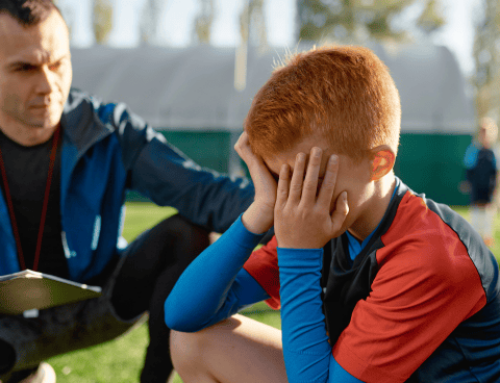Major Differences Between High School and College Sports
The difference between high school and college sports is astronomical. Two percent of high school athletes get a college scholarship to play their sport. The gap between size, ability, work ethic, and dedication is extremely wide for athletes who play college sports compared to high school sports.
College sports aren’t for everyone. Most want it but can’t achieve it. Some achieve it but don’t really want it. Others are happy to get a free education along with playing the sport they love (which is awesome) and move on. But, to get into the sports aspect of it is simple and complicated all at once.
Out On Your Own
One of the biggest differences between high school and college athletes is that college athletes are on their own for the first time. You live under your parents’ roof in high school and have far fewer responsibilities.
College athletes are dealing with a whole new set of responsibilities on their plate. Your mom or dad isn’t there to make sure you’re awake for school. You don’t have anyone to cook and clean for you either.
On top of that, your practice and training schedule is much fuller. Plus, you may be attending a school with a huge student body and possibly in a big city for the first time in your life.
You’re also dealing with a new set of social elements. While you’ll probably be hanging out mostly with your teammates, you still have to engage with other students in your classes and at social functions.
Lastly, being away from family and friends you’ve known your whole life can be challenging for some college athletes.
Two Full-Time Jobs
It’s hard enough for new college students to adjust to their new life. It’s twice as hard for student-athletes to adjust to it. Attending college with a full schedule of classes is like having a full-time job. Playing a college sport is also like having a full-time job.
Most high school athletes don’t usually worry about this. And if they do have a job in high school, it’s usually a part-time job while your classes are less demanding and so is your coach.
College athletes do, however, have tutors. So that’s a place where the burden is lifted a bit.
But working out first thing in the morning, as most college sports teams do and then having practiced in the afternoon after classes, leaves little time for homework in the evening.
Plus, when it’s finally time to study or write a paper at the end of the day most college athletes are sore and exhausted.
Talent Level, Size, and Mindset
As mentioned above, Only the most physically gifted tend to cut. However, that; ‘s not always the case.
Some athletes who aren’t born with natural physical size, strength, or ability can overcome that by working hard. They can turn grit and determination into a place at the collegiate level.
Often, college athletes are just starting to grow into their bodies. They’re experiencing a newer form of strength that most high school athletes don’t have. College athletes also start filling out their frames.
Most high school training programs aren’t nearly as advanced as college training programs. And college athletes have top-level trainers and weight lifting coaches to help them along, not to mention nutritionists that help customize each athletes’ diet.
Everyone was typically the best player by far on their high school team in college. They were probably the tallest, fastest, or strongest, depending on the sport. So the margin for error is huge between high school and college sports.
Most high school athletes are playing for fun. College athletes have a mindset of making to their ultimate goal: the pros. They eat, drink and sleep their sport. They sacrifice so much in pursuit of their dream.
Whereas high school athletes, for the most part try their best and understand they won’t be playing after they graduate, and that’s OK. As mentioned, college sports aren’t for everyone.
High School to College
The differences between high school and college are wide. The differences between high school and college sports are huge. College athletes have a whole new set of responsibilities, like living independently for the first time.
Increased study and training schedules. Plus, they’re playing with and against other athletes that are superior to the competition they faced in high school.
RECOMMENDED FOR YOU
MOST POPULAR
Major Differences Between High School and College Sports
The difference between high school and college sports is astronomical. Two percent of high school athletes get a college scholarship to play their sport. The gap between size, ability, work ethic, and dedication is extremely wide for athletes who play college sports compared to high school sports.
College sports aren’t for everyone. Most want it but can’t achieve it. Some achieve it but don’t really want it. Others are happy to get a free education along with playing the sport they love (which is awesome) and move on. But, to get into the sports aspect of it is simple and complicated all at once.
Out On Your Own
One of the biggest differences between high school and college athletes is that college athletes are on their own for the first time. You live under your parents’ roof in high school and have far fewer responsibilities.
College athletes are dealing with a whole new set of responsibilities on their plate. Your mom or dad isn’t there to make sure you’re awake for school. You don’t have anyone to cook and clean for you either.
On top of that, your practice and training schedule is much fuller. Plus, you may be attending a school with a huge student body and possibly in a big city for the first time in your life.
You’re also dealing with a new set of social elements. While you’ll probably be hanging out mostly with your teammates, you still have to engage with other students in your classes and at social functions.
Lastly, being away from family and friends you’ve known your whole life can be challenging for some college athletes.
Two Full-Time Jobs
It’s hard enough for new college students to adjust to their new life. It’s twice as hard for student-athletes to adjust to it. Attending college with a full schedule of classes is like having a full-time job. Playing a college sport is also like having a full-time job.
Most high school athletes don’t usually worry about this. And if they do have a job in high school, it’s usually a part-time job while your classes are less demanding and so is your coach.
College athletes do, however, have tutors. So that’s a place where the burden is lifted a bit.
But working out first thing in the morning, as most college sports teams do and then having practiced in the afternoon after classes, leaves little time for homework in the evening.
Plus, when it’s finally time to study or write a paper at the end of the day most college athletes are sore and exhausted.
Talent Level, Size, and Mindset
As mentioned above, Only the most physically gifted tend to cut. However, that; ‘s not always the case.
Some athletes who aren’t born with natural physical size, strength, or ability can overcome that by working hard. They can turn grit and determination into a place at the collegiate level.
Often, college athletes are just starting to grow into their bodies. They’re experiencing a newer form of strength that most high school athletes don’t have. College athletes also start filling out their frames.
Most high school training programs aren’t nearly as advanced as college training programs. And college athletes have top-level trainers and weight lifting coaches to help them along, not to mention nutritionists that help customize each athletes’ diet.
Everyone was typically the best player by far on their high school team in college. They were probably the tallest, fastest, or strongest, depending on the sport. So the margin for error is huge between high school and college sports.
Most high school athletes are playing for fun. College athletes have a mindset of making to their ultimate goal: the pros. They eat, drink and sleep their sport. They sacrifice so much in pursuit of their dream.
Whereas high school athletes, for the most part try their best and understand they won’t be playing after they graduate, and that’s OK. As mentioned, college sports aren’t for everyone.
High School to College
The differences between high school and college are wide. The differences between high school and college sports are huge. College athletes have a whole new set of responsibilities, like living independently for the first time.
Increased study and training schedules. Plus, they’re playing with and against other athletes that are superior to the competition they faced in high school.
RECOMMENDED FOR YOU
Create A Free Recruiting Profile Today!
CaptainU helps athletes & parents not only be proactive but also to manage and take control of their entire recruiting journey.











